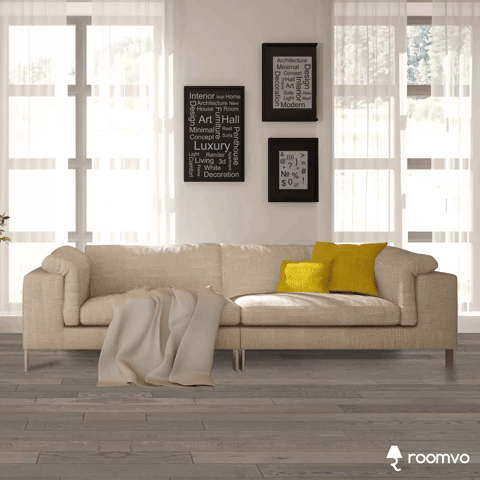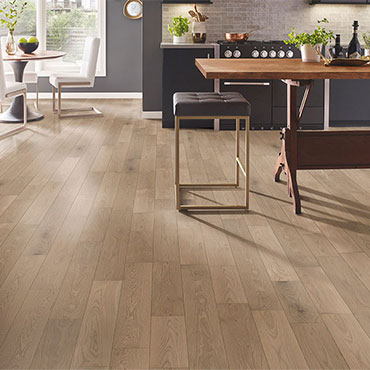
Is moisture-prone areas Flooring Ideal for Kitchens?
In the modern home, the kitchen is more than just a space for cooking—it's the heart of the home, a blend of functionality and design, where family and friends often gather. Flooring choices in this area need to balance aesthetics and practicality, ensuring durability under daily foot traffic and the occasional spill. Engineered high-traffic areas offers a compelling option with its beauty and resilience, combining the warmth and elegance of natural wood with a stable, layered construction that resists moisture and temperature fluctuations. But is it truly the right choice for a kitchen?
Below, we dive into the advantages and considerations when choosing engineered hardwood for a kitchen, helping you decide if it aligns with your needs, style, and the unique demands of this central space.
Why Engineered Hardwood Flooring Appeals to Kitchen Design
Pros of Engineered Hardwood Flooring in Kitchens
- Durability: Thanks to its layered construction, engineered wood is less prone to warping than solid hardwood, even in moisture-prone areas like kitchens. This durability makes it suitable for high-traffic areas, including the kitchen, where spills are inevitable.
- Visual Warmth: Engineered hardwood brings a classic, warm look that enhances kitchen design, whether your style leans modern, traditional, or rustic. The top layer of real hardwood creates the elegance of flexibility, adding character and value to your kitchen space.
- Ease of Installation: Many engineered hardwood options are DIY-friendly, with floating or glue-down installation methods. Homeowners looking to renovate can save on installation costs and tackle this project with confidence.
- Versatility in Style Options: With choices ranging from oak to maple and walnut, engineered hardwood flooring offers various finishes, shades, and wood grains to complement any kitchen style.
- Eco-Friendliness: Engineered wood uses less hardwood per plank, and many options are sourced from sustainable materials, appealing to environmentally conscious homeowners.
Cons of Engineered Hardwood Flooring in Kitchens
- Moisture Sensitivity: Although engineered hardwood resists moisture better than solid wood, it is not entirely waterproof. If not quickly cleaned, spills or leaks can penetrate the surface and damage the sublayers, which may lead to warping over time.
- Scratches and Maintenance: Engineered wood may show signs of wear and scratches, especially in a high-use kitchen. While it can be refinished, the number of times is limited compared to solid wood, which may be a consideration if you want your floor to look new over the long term.
- Cost Considerations: can be more affordable than solid hardwood but is often more expensive than options like laminate or luxury vinyl tile. For homeowners on a budget, this can be a deciding factor.
Key Considerations for Engineered Hardwood Flooring in Kitchens
1. Room Purpose
The kitchen’s functional demands require a flooring choice that balances durability and aesthetic appeal. Engineered hardwood provides a warm, inviting look while standing up well to the high traffic and occasional spillages typical of a kitchen. However, periodic maintenance is essential to maintain its look and longevity.
2. Design Style
Engineered hardwood enhances a kitchen’s design, complementing a range of styles from rustic to modern. Its natural wood grain adds an elegant touch that fits well with various cabinetry and countertop choices, helping to create a cohesive design.
3. Durability
Engineered hardwood's layered construction makes it more resilient against moisture and temperature changes, a crucial advantage for kitchens. However, choosing a higher-quality product with a thicker top layer can extend its lifespan, especially in active family kitchens.
4. Moisture Exposure
Engineered hardwood is more moisture-resistant than solid wood but is not waterproof. For families who love to cook and may face frequent spills, placing rugs or mats around the sink and stove can help protect the floor from excess moisture, preserving its quality and appearance.
5. Budget
Compared to high-end hardwood, engineered hardwood is a cost-effective alternative that doesn’t compromise on style. However, it remains pricier than vinyl or laminate options. For homeowners who prioritize a hardwood look without exceeding budget constraints, engineered hardwood strikes a reasonable balance.
6. Subfloor Condition
Engineered hardwood can be installed over various subfloor types, including concrete, a common base in kitchen areas. This flexibility can simplify installation, making it accessible even for DIY projects, provided the subfloor is level and moisture-free.
7. Eco-Friendliness
For eco-conscious homeowners, engineered hardwood’s efficient use of natural resources and availability of sustainably sourced options make it a preferable choice. However, it’s essential to verify certifications to ensure the flooring meets environmental standards.
8. Soundproofing/Insulation
Engineered hardwood adds a level of sound insulation, which is beneficial in a high-traffic kitchen. The thickness of the product, combined with an underlayment, can dampen sounds, creating a quieter kitchen environment, especially in open-plan homes.
9. Health Considerations
Engineered hardwood flooring, especially when finished with low-VOC products, contributes to a healthier indoor air environment. This can be a significant consideration for families with young children or individuals sensitive to airborne chemicals, as it helps maintain a cleaner kitchen atmosphere.
Impact of Engineered Hardwood on Kitchen Design
Color Scheme and Visual Appeal The color and grain of engineered hardwood act as a unifying element, tying together cabinetry, countertops, and décor. Darker shades can create a rich, luxurious feel, while lighter tones lend an airy, spacious atmosphere, making engineered hardwood a versatile foundation for the kitchen’s color palette.
Style and Theme Coherence With its natural aesthetic, engineered hardwood complements a variety of design themes, adding authenticity to traditional designs and warmth to modern or minimalist styles. Its versatility in shades and finishes means it can adapt to evolving design trends, ensuring longevity in both style and function.
Texture and Feel Engineered hardwood’s smooth finish and warm texture create a comfortable and inviting feel, perfect for a family kitchen. Its slight give underfoot provides comfort, making extended periods of standing, such as during meal prep, more manageable.
Room Size Perception For smaller kitchens, lighter-colored engineered hardwood can make the space feel larger and more open. Conversely, in larger kitchens, darker tones add coziness, making vast spaces feel more intimate and grounded.
Comfort and Usability Engineered hardwood provides a softer and more forgiving surface than tile, reducing foot fatigue—a real plus for those who spend long hours cooking. Its temperature stability also makes it more comfortable to walk on than tile in colder months.
Acoustic Impact Engineered hardwood absorbs sound better than tile, helping to reduce noise in busy kitchens. This quality makes it ideal for open-plan layouts, where kitchen sounds can otherwise travel into adjacent living spaces.
Pattern and Focal Points Engineered hardwood often serves as a subtle, seamless base that allows other elements, such as cabinetry or a unique backsplash, to stand out. It offers visual continuity, creating a smooth flow through the kitchen and surrounding areas without overwhelming the design.
Final Thoughts on Engineered Hardwood Flooring in Kitchens
When choosing engineered hardwood for a kitchen, you’re opting for a combination of style, resilience, and comfort. Its layered design provides excellent moisture resistance compared to moisture-prone areas, making it suitable for the kitchen’s demands. However, it’s essential to remember that engineered hardwood is not entirely waterproof, so some care is needed to prevent damage from spills or leaks.
Overall, engineered hardwood is an appealing choice for those who desire the look of wood with added durability. Its adaptability to various styles and eco-friendliness further make it an attractive option for homeowners looking to enhance their kitchen’s aesthetic and functional appeal. With a little maintenance, engineered hardwood can be a long-lasting and beautiful addition to any kitchen.
Choose Flooring Product : Laminate Flooring Ideas (18) : Ceramic/Porcelain Ideas (18) : Vinyl/Resilient Ideas (5) : Area Rugs Ideas (2) : Wood Flooring Ideas (130) : LVT/LVP Ideas (28) : Area Rugs Ideas (2)

roomvo
Visualize Flooring In Your Kitchen!
Roomvo makes picking new floors easy. Take advantage of our room visualizer tool to see what your home will look like with any flooring products from our catalog. Just upload your photo to see your room come to life.
 Blog
BlogKitchen - Area Rugs
Should You Use an Area Rug in Your Kitchen? Pros, Cons, and Design Tips
In this engaging blog post, we explore the idea of using in the kitchen, a unique addition that brings warmth, style, and comfort to this high-traffic space. Kitchens, often the heart of the home, require functional yet stylish design elements to balance their dual roles as workspaces and social hubs. We break down the pros and cons of adding area rugs in the kitchen, addressing factors like durability, comfort, and moisture resistance while highlighting how the right rug can elevate a kitchen’s visual appeal.
Each section offers practical guidance tailored to homeowners and consumers, with a friendly tone that simplifies complex considerations like eco-friendliness, budget, and soundproofing. We also provide insights into choosing a rug that aligns with your kitchen's design style, color scheme, and overall theme, ensuring a harmonious and practical addition to the space. Whether you’re looking to define specific zones in an open-plan kitchen or add a cozy touch to your cooking area, this guide helps you make an informed decision on incorporating area rugs into your kitchen’s décor.
Learn More Blog
BlogKitchen - Carpeting
Is Carpeting Right for Your Kitchen? Pros, Cons, and Practical Advice
This blog post by Olivia Wainwright dives into the unconventional choice of using carpeting in the kitchen, exploring whether it’s a practical yet stylish option for homeowners. Given the kitchen's dual role as a functional workspace and social hub, selecting the right flooring impacts everything from aesthetics to usability. aesthetics offers warmth, comfort, and sound absorption but raises concerns about moisture resistance and maintenance.
Each section breaks down essential considerations for kitchen flooring, such as durability, design style, and eco-friendliness, helping homeowners weigh the pros and cons. For those seeking a cozy and unique kitchen aesthetic, this guide provides insights into how carpeting could enhance comfort while addressing potential challenges in upkeep.
Learn More Blog
BlogKitchen - Ceramic Tile
Is Ceramic Tile the Best Kitchen Flooring? Pros, Cons & Design Tips for Homeowners
This blog post dives into the practicality and beauty of kitchen flooring as a kitchen flooring option, explaining why it’s often a top choice for homeowners. The article covers design considerations such as durability, moisture resistance, style versatility, and eco-friendliness, making it a comprehensive guide for those seeking an affordable, stylish, and functional kitchen floor solution.
Learn More Blog
BlogModern Kitchen - Contemporary Rugs
Modern Rugs in the Kitchen: Design Inspiration for Interior Designers
Modern kitchens blend functionality with style,serving as both a workspace and a social hub. This blog post explores the roleof modern Modern in enhancing these spaces, providing interior designers withinsights into their design impact. The article covers key considerations likedurability, moisture resistance, and budget, emphasizing the practicality andaesthetic value rugs bring to modern kitchens.
With their clean lines, bold patterns, and versatile materials, modernrugs offer a unique opportunity to elevate kitchen interiors. The blog providesactionable advice on selecting the right rug, ensuring it aligns with thekitchen’s purpose and modern design elements, while addressing practicalconcerns like maintenance and eco-friendliness.
Learn More























